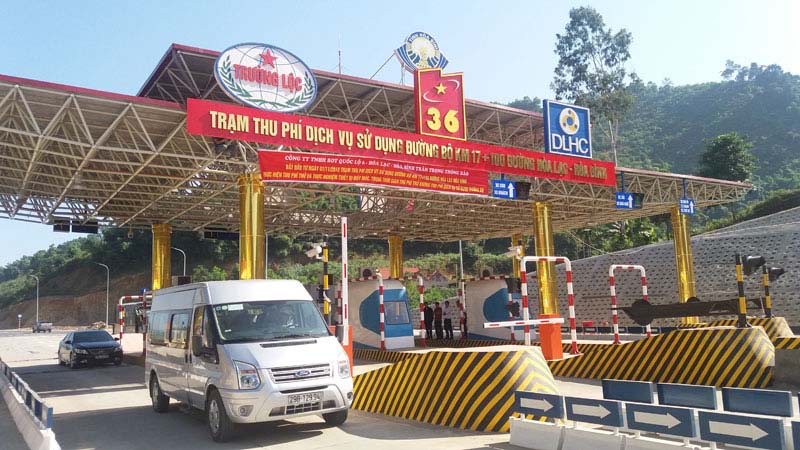
(HBO) – Deputy Minister of Transport Nguyen Van Cong recently inked Decision No.3783/BGTVT-CT dated April 24, 2019, on the collection of road toll fee on Hoa Lac-Hoa Binh Highway from May 3.

Toll fee
collection on Hoa Lac-Hoa Binh Highway will begin from 0:00 on May 3, 2019.
Accordingly,
the BOT National Highway 6-Hoa Lac-Hoa Binh Company will collect the fee at its
toll station at Km 17 + 100 in Yen Quang commune, Ky Son district, to refund
capital for the Hoa Lac-Hoa Binh construction project and to upgrade National
Road No.6’s Xuan Mai-Hoa Binh section implemented under a
build-operate-transfer model.
The toll fee is stipulated at Circular No.35/2016/TT-BGTVT dated November 15,
2016, and Circular No.60/2018/TT_BGTVT dated December 21, 2018, and in
accordance with BOT Contract No.06/HD.BOT-BGTVT dated February 10, 2014, and
appendix of the BOT contract No.06/HD.BOT-BGTVT/PL 1 dated March 22, 2019.
BOT National Highway 6-Xuan Mai-Hoa Lac-Hoa Binh Company must collect fees in
line with current regulations and ensure traffic safety.
The Vietnam Road Administration is ordered to exercise its state management
authority, and direct contractor and competent businesses to carry out the toll
collection in line with regulations.
The 25.7 kilometre Hoa Lac-Hoa Binh highway runs from Hoa Lac Interchange in
Hanoi’s Thach That district to Trung Minh Commune, Hoa Binh city. The road
allows maximum speed of 80 kilometres per hour.
It was invested at the total cost of more than 2.72 trillion VND by Corporation
No.36 under the BOT model. Construction on the road began in May 2014.
The new route shortens the travel distance between Hanoi and Hoa Binh by 20
kilometres, and cut travel time between the two localities to only one hour.
Under the BOT contract, toll collection was scheduled to begin from
November 1, 2018./.
The Standing Board of the Hoa Binh provincial Party Committee has agreed in principle on a proposal by the Standing Board of the Party Committee of Hoa Binh city to gather feedback on the city’s 1:2000 zoning plan, which forms part of its broader urban development strategy.
Hoa Binh province has made notable progress in public administration reform and digital government development, with the satisfaction index among citizens and businesses reaching over 84%, according to recent government evaluations.
Thanks to great efforts by local authorities in recent times, the governance and public administration performance of Mai Chau district has been significantly improved.
In the afternoon of June 6, the Party Committee, the People's Council, the People's Committee and the Fatherland Front of Lac Son district solemnly held a meeting to celebrate the 139th anniversary of the district's founding (1886–2025) and the 79th anniversary of the establishment of the district's Party Committee (1946–2025). There was the attendance of Mr. Bui Van Thang, the Vice Chairman of the Provincial People's Council; Mr. Quach Tat Liem, the Vice Chairman of the Provincial People's Committee; Ms. Dang Bich Ngoc, the Deputy Head of the National Assembly Delegation of the province; as well as the former leaders of the province and district through various periods, who are the natives of the district.
Implementing the Politburo’s Resolution No. 57-NQ/TW on breakthroughs in science – technology, innovation, and digital transformation is a golden opportunity for the northern mountainous province of Hoa Binh to renew growth model, improve competitive edge and shorten digital gap.
Resolution 57-NQ/TW, issued by the Politburo on December 22, 2024, identifies sci-tech, innovation, and digital transformation as strategic breakthroughs to build a developed and prosperous nation. In Hoa Binh province, this spirit is not just a slogan, it’s being put into action through concrete initiatives that form a "new development triangle”: digital citizenship, digital economy, and digital administration.



